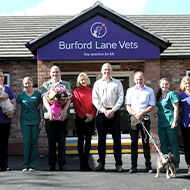
North Star Vets aims to give ‘leg up to vets who want to be masters of their own destinies’.
A new veterinary practice group that aims to empower professionals to own their own practice has launched in Cheshire.
‘North Star Vets’ is the brainchild of Dr Sean Cleary, Dr Richard Thomas and chartered accountant, Jane Platt, who were all partners in The Willows Veterinary Group before selling its 28 small animal, large animal and equine clinics to VetPartners in 2018.
The trio opened their first practice - Burford Lane Vets - last month in Lymm, and they plan to open 10 more practices over the next five years. The Group’s innovative model means that the head vets at each practice will have the opportunity to own an equity stake in their practice without any capital investment.
Dr Sean Cleary, from North Star Vets, said: “We have benefited from the shift in the industry that saw veterinary groups acquired by large corporate businesses. However, this has inadvertently made it difficult for the next generation of vets to follow the traditional route of buying into a practice as they progress from a junior role to partner, as corporate interest has pushed the values of practices to unaffordable levels for most vets.
“We want to bridge that gap and give a leg up to vets who want to be masters of their own destinies, without the difficulty of starting from scratch or having to find a huge initial investment.”
He added: “Our innovative model helps great vets set up in business as leaders of their own practice and our unique offering is already attracting interest from high-calibre individuals. We would encourage any colleagues out there who feel they would like to join us in our new venture to get in touch via our website.”
Image (C) North Star Vets.



 The Veterinary Medicines Directorate (VMD) is inviting applications from veterinary students to attend a one-week extramural studies (EMS) placement in July 2026.
The Veterinary Medicines Directorate (VMD) is inviting applications from veterinary students to attend a one-week extramural studies (EMS) placement in July 2026.